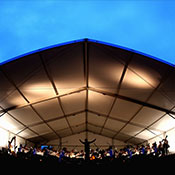
MSO Musicians’ Summer Playlists
David Lewellen
PUBLISHED
Tagged Under: MSO Musicians, Musician
Let’s get this out of the way first: Most orchestra musicians do not listen to classical music on their own time for fun.
There are several reasons. After a lifetime of study, or a hard week of rehearsing and performing, they are ready for a break; and it is difficult to turn off the analytical part of their brain and to listen without thinking about the challenges of playing.
But as highly trained musicians, they appreciate the skill involved in other genres, and during the quarantine, MSO musicians’ houses have been filled with the sounds of everything from ’80s pop to indie rock to blues. After a four-month break, they’re even listening to classical.
“I can’t listen to Mahler or Tchaikovsky the way anyone else does,” said bass trombonist John Thevenet. “All I hear is the bass trombone line.” In normal times, his classical listening is mostly upcoming pieces that he’s unfamiliar with – or Mozart or Haydn, who hardly ever wrote for bass trombone.
His 3-year-old daughter, on the other hand, gets classical exposure through the Little Einstein video series, “and she walks around singing Beethoven 5 and Carmen. Plus ‘The Wheels on the Bus’ and ‘Baby Shark.’”
And his wife, Mylene, is “a savant when it comes to the one-hit wonders of the ’80s. Those were our formative years. At the eighth-grade dance, that’s the music that was playing.”
For himself, Thevenet enjoys listening to movie soundtracks by John Williams, James Horner, or Hans Zimmer – even though live performance of those soundtracks makes up an increasing portion of every orchestra’s workload. “It’s different,” he said. “It’s not something I spent years of my life practicing.”
In the extended time away from work, assistant principal bassoon Rudi Heinrich has been rediscovering classical music as a listening experience; he mentioned Metropolitan Opera streams and the MSO’s Musical Journey series. “Ken-David does a great job with those,” he said, referring to music director Ken-David Masur, who hosts the weekly podcast. But “a lot of listening happens while life happens, while I’m with the kids or washing dishes. Classical music demands more from me.”
Heinrich’s parents listened to a lot of rock, and he was a teenager when he discovered “popular music worth listening to that wasn’t on the radio.” His gateway was classic blues artists such as Muddy Waters and Howlin’ Wolf, and he moved on to jazz. Now, “I like to explore on Spotify, to follow suggestions and see where it takes me. We listen to a lot of rock, hip-hop, soul, dance music.” His children, ages 9 and almost 7, are “Lizzo superfans.”
Bassist Andrew Raciti discovered the music of Ben Folds through his children, ages 14 and 11, and they unknowingly pick up a lot of classical music from him. At a recent summer festival in Grand Teton, Wyoming, he was preparing for a performance of Mahler’s Third Symhony, “and they didn’t know what they were whistling.”
Raciti also listens to the Red Hot Chili Peppers (he thinks they upped their game after Flea’s mid-career stint at conservatory) and Bjork. “She should be making the rounds with an orchestra,” he said of the Icelandic pop singer. “Her music is lush and full of moving parts. It would take an imaginative orchestrator to make it work, but boy.”
For concentrated listening, he will put on a vinyl recording of 1960s-era jazz and “lie down in the living room and listen. I don’t put that on when I have to do something.” He keeps pop playlists on his phone for more casual settings like working out.
But the “soundtrack of my summer” has been 12 very short pieces by Haydn for a viol and two barytons – obsolete instruments now, but Raciti is arranging the music for his students to play. “They’re some of the best things he ever wrote. They’re little gems that haven’t been arranged for anything else, but they work very well for three basses.”
Cellist Peter Thomas has taken the break from Uihlein Hall as an opportunity to perform in his driveway and other informal settings on electric cello. “It’s everything from Bach to Metallica,” he said. “The Beatles, U2, Coldplay, Radiohead – it’s just the music I’ve been listening to my entire life.”
Everything influences everything; Thomas says he tries to play “with the same type of intensity as Radiohead,” and he’s more comfortable now playing in the very high register of the cello, because so many pop groups ask for that effect.
During the four months off from the pandemic, “it’s been liberating to play what I want to play,” Thomas said. “I find out more about myself playing Bach.” The Baroque master’s six suites for solo cello are the foundation of the repertoire for the instrument, but Thomas has been concentrating on the harder, and lesser-known, suites 4-6, as “music that can grow with me through my entire career.”


